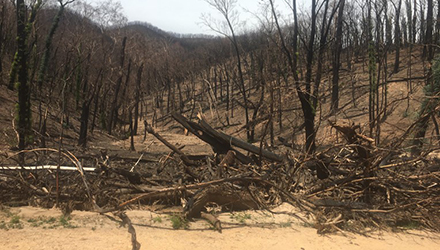The University of Tasmania will require academic staff undergo training on the importance of research integrity and the disclosure of conflicts of interest. It follows the university’s investigation into the publication of a flawed study last year that linked forestry operations and bushfire severity. Source: Timberbiz
The investigation was prompted by concerns raised by Bob Gordon and Dr Kevin Harding from the Institute of Foresters of Australia.
“These findings vindicate our concerns, and we thank the University for acknowledging that there were serious issues with this research that needed to be addressed,” IFA president Bob Gordon said.
“We particularly welcome the fact that the University will now mandate a training program on research integrity for academics at the school as a result of our complaint.”
Last year the Australian Senate passed a motion condemning the flawed study and its misuse by the Australian Greens.
The motion to condemn the error-ridden research and the way it was misused by the Greens and activists to attack sustainable forestry, was moved by Assistant Minister for Forestry and Fisheries Senator Jonno Duniam.
The motion, among other things, called on the Bob Brown Foundation and the Australian Greens to apologise.
The motion was supported by Coalition and ALP members, but not by the Greens, despite the authors of the research paper themselves conceding it should not have been published.
The motion noted “that the withdrawal of this paper was required because of the number of significant errors and wrong conclusions and that it did not meet the standard for ‘high-quality scientific works’ as required by the Multidisciplinary Digital Publishing Institute (MDPI)”.
AFPA Deputy Chief Executive Victor Violante commended the university for investigating the matter and taking steps to ensure that all academic staff are mindful of the need to disclose conflicts of interest and to ensure their work is scientifically sound and meets the university’s high standards.
“AFPA wrote to Vice-Chancellor Rufus Black last year expressing concern that a scientific paper co-authored by UTAS academics had been withdrawn by the publishing journal due to significant errors, and that one of the authors, Dr Jennifer Sanger, had subsequently disclosed that she was employed by the Bob Brown Foundation (BBF) to run its campaign to shut down Tasmania’s forestry industry,” Mr Violante said.
“The investigation confirmed there were shortcomings in the academic process, and I commend UTAS for committing to ensure academic staff are aware of their responsibilities and undergo training to better understand their obligations.”
Mr Violante said that while the review found the conduct of the academics did not meet the high threshold required to amount to “research misconduct”, the University had advised AFPA that the investigation highlighted “the need to support process improvement by providing further training and guidance” on:
- The level of rigour required by researchers in reviewing data and methods of research to ensure accuracy prior to submission of manuscripts for publication.
- The expectations and standards required of senior researchers conducting and supervising research particularly where data is collected by students and early career researchers.
- The standards and expectations of our researchers to correct the public record as far as reasonably practicable.
- Disclosures of conflicts of interest, particularly in relation to voluntary/non-financial affiliations.
Mr Violante said the scientific consensus is that reducing fuel loads in the forest through a combination of mechanical fuel reduction and controlled burns play a vital role in bushfire mitigation, and that forestry operations do not increase bushfire severity.
“Research has found that in the eucalypt forests of south-eastern Australia, an annual reduction program of 5% of the landscape could reduce the extent of bushfires by as much as 50%,” Mr Violante said.







